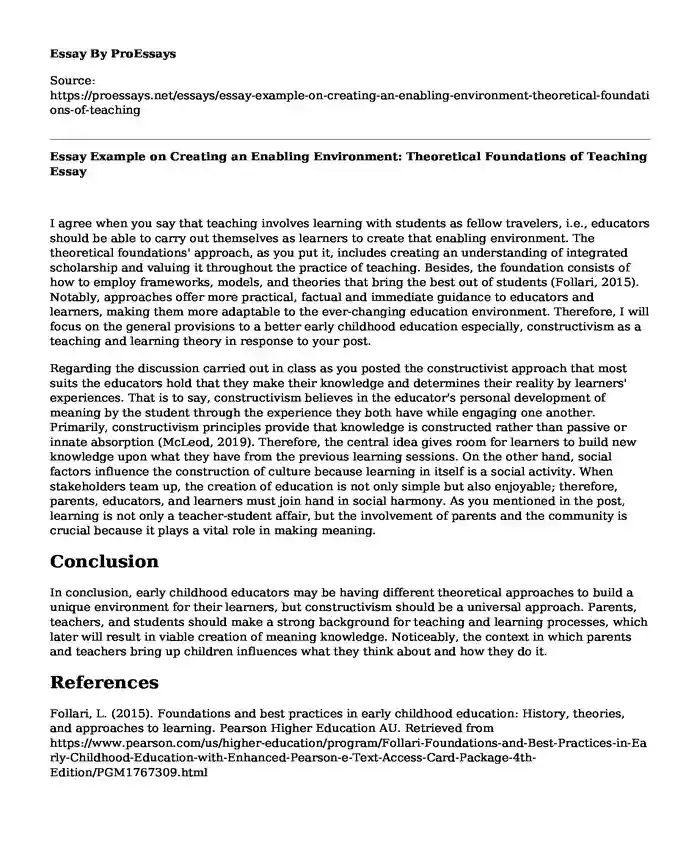I agree when you say that teaching involves learning with students as fellow travelers, i.e., educators should be able to carry out themselves as learners to create that enabling environment. The theoretical foundations' approach, as you put it, includes creating an understanding of integrated scholarship and valuing it throughout the practice of teaching. Besides, the foundation consists of how to employ frameworks, models, and theories that bring the best out of students (Follari, 2015). Notably, approaches offer more practical, factual and immediate guidance to educators and learners, making them more adaptable to the ever-changing education environment. Therefore, I will focus on the general provisions to a better early childhood education especially, constructivism as a teaching and learning theory in response to your post.
Regarding the discussion carried out in class as you posted the constructivist approach that most suits the educators hold that they make their knowledge and determines their reality by learners' experiences. That is to say, constructivism believes in the educator's personal development of meaning by the student through the experience they both have while engaging one another. Primarily, constructivism principles provide that knowledge is constructed rather than passive or innate absorption (McLeod, 2019). Therefore, the central idea gives room for learners to build new knowledge upon what they have from the previous learning sessions. On the other hand, social factors influence the construction of culture because learning in itself is a social activity. When stakeholders team up, the creation of education is not only simple but also enjoyable; therefore, parents, educators, and learners must join hand in social harmony. As you mentioned in the post, learning is not only a teacher-student affair, but the involvement of parents and the community is crucial because it plays a vital role in making meaning.
Conclusion
In conclusion, early childhood educators may be having different theoretical approaches to build a unique environment for their learners, but constructivism should be a universal approach. Parents, teachers, and students should make a strong background for teaching and learning processes, which later will result in viable creation of meaning knowledge. Noticeably, the context in which parents and teachers bring up children influences what they think about and how they do it.
References
Follari, L. (2015). Foundations and best practices in early childhood education: History, theories, and approaches to learning. Pearson Higher Education AU. Retrieved from https://www.pearson.com/us/higher-education/program/Follari-Foundations-and-Best-Practices-in-Early-Childhood-Education-with-Enhanced-Pearson-e-Text-Access-Card-Package-4th-Edition/PGM1767309.html
McLeod, S. (2019). Constructivism as a theory for teaching and learning. Simply psychology. Retrieved from https://www.simplypsychology.org/constructivism.html
Cite this page
Essay Example on Creating an Enabling Environment: Theoretical Foundations of Teaching. (2023, Sep 04). Retrieved from https://proessays.net/essays/essay-example-on-creating-an-enabling-environment-theoretical-foundations-of-teaching
If you are the original author of this essay and no longer wish to have it published on the ProEssays website, please click below to request its removal:
- Locus of Control as a Contributing Factor to Youth Delinquency and Academic Failure
- What Can School Staff Do to Prevent Bullying? - Essay Sample
- Essay Sample on Reasons for Wanting to Study
- Essay Example on Language Development: Exploring Perspectives With Shelia Kennison
- Essay Example on Segregation in Schools: Children Fight for Equality and Liberty
- Essay Sample on Parent Involvement in Education: Improving School Outcomes
- Paper on The Phonemes /b/ and /p/







